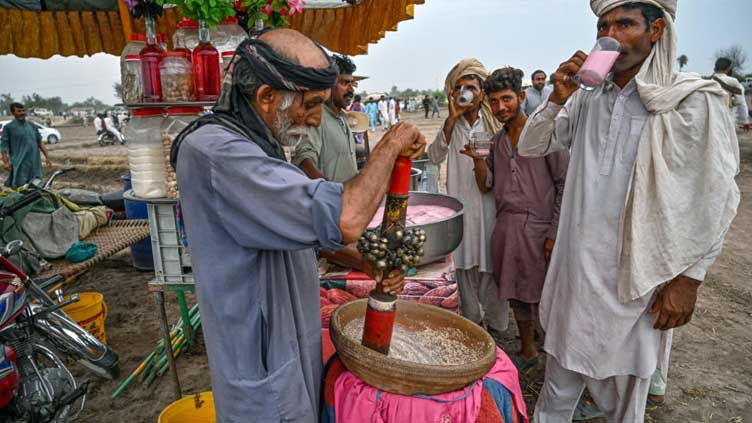Sindh, Punjab's Sufi festivals reclaim spirit after violence

Pakistan
Rhythmic drums and spirited dancing are once again bringing life to the shrines of Sufi saints
Shah Jiwana (Pakistan) (AFP) – Rhythmic drums and spirited dancing are once again bringing life to the shrines of Sufi saints, where festivals were long stifled by militant violence.
As the harvest season ends and schools finish for the summer, villagers climb atop tractor trolleys, buses and rickshaws to head to the annual celebrations at Sufi shrines dotted across the country.
"Those who cannot meet during the rest of the year reunite at the fair," said Muhammad Nawaz, a farmer from Punjab province at the annual "mela" to honour saint Shah Jiwana in Jhang city in May.
"These fairs and Punjab's culture share a profound connection, one of love and brotherhood."
Fairgrounds, musicians, traditional wrestlers and motorcycle acrobats delight pilgrims lit by lanterns of all colours -- but always under the watchful eye of hundreds of police officers.
Centuries-old Sufi orders across the Islamic world have millions of followers, from Turkey to South Asia, and their beliefs are rooted in mysticism and a devotion to saints.

Many orthodox hardliners consider Sufi beliefs heretical, however, and militant groups such as the Pakistani Taliban and Islamic State have carried out bloody attacks at shrines and festivals.
In Pakistan, the attacks led authorities to ban festivals or limit their activities until recently. "The goal was to avoid risking public lives," said Alloudin Mehmood, a government official at Bari Imam shrine in Islamabad, targeted by a 2005 suicide bombing that killed 19 people.
Security has dramatically improved after several military operations, allowing celebrations to slowly return. "Only after receiving security clearance was the festival permitted last year, ending a 16-year hiatus," Mehmood added.
The event was shortened from five days to three, with mobile phone signals suspended for security reasons.
'Culture is resilient'
The landscape of rural Pakistan is adorned with thousands of Sufi shrines, varying in size from grand edifices to modest structures, each steeped in a tapestry of associated legends.
Particularly in Punjab and Sindh, saints, commonly referred to as "Pirs," are revered and miracles attributed to their spiritual presence. "These shrines have endured threats and persecution," said anthropologist and author Zulfiqar Ali Kalhoro.
"Culture always has a remarkable resilience, capable of absorbing shocks and persevering through challenging times." The annual celebrations commemorate the anniversaries of a saint's death and symbolise the spiritual union between devotees and the divine.
"Pilgrims find solace, healing, release and entertainment at these events that celebrate the 'friends of God'," said Carl W. Ernst, who has authored several books on Sufism.

Sufism has inspired some of Pakistan's most beloved artists, writers and musicians. Sufi shrines often attract marginalised groups, including transgender women and drug addicts. "We are never as well-received as at festivals," Khusbhoo, a transgender woman, told AFP.
Come to the fair
At the Shah Jiwana shrine, devotion gives way to entertainment in the late afternoon. A juice seller belts out a famous Punjabi song: "Forget about your responsibilities for a while; let's head to the fair instead."

Thousands turn to the fields to witness traditional games such as Kabaddi, a rough contact sport where opponents slap each other around the face, and tent pegging, a more graceful display of horsemanship.
Against the neon background of the fairgrounds, 16-year-old stunt girl Fatima Noor prepares her motorbike. Defying both gravity and social taboos, she circles the "wall of death" to the amazement of the crowd -- a chance to earn some money for her family.
"These fairs must be held, because we do not have any other employment opportunities," she said. Eighteen-year-old Hamid Ijaz delighted in the celebrations, disrupted for much of his childhood.
"Because of how widespread hate and sectarianism are in our country, it's crucial to organise events like these where people can come together and foster love," he told AFP.


